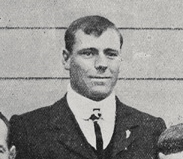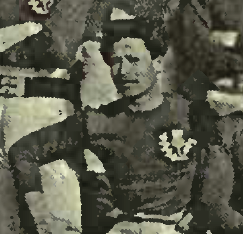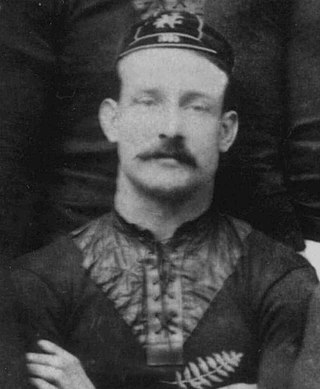Related Research Articles

Erith Gwyn Nicholls was a Welsh rugby union player who gained 24 caps for Wales as a centre. Nicholls was known as the "Prince of Threequarters".
George Wilson may refer to:
Edinburgh University Rugby Football Club is a leading rugby union side based in Edinburgh, Scotland which currently plays its fixtures in the Edinburgh Regional Shield competition and the British Universities Premiership. It is one of the eight founder members of the Scottish Rugby Union. In the years prior to the SRU's introduction of club leagues in 1973 and the advent of professionalism in the 1990s, EURFC was a major club power and it won the 'unofficial' Scottish Club championship several times. It remains a club with an all-student committee, and is only open to students of the University of Edinburgh. The club runs a men's team and a women's team; both playing in the university leagues.
William "Massa" Johnston was a New Zealand rugby union and rugby league international. He was part of the 1905 Original All Blacks tour and the professional 1907-1908 New Zealand rugby tour of Great Britain.
Malone RFC is a rugby union club based in Belfast, in Northern Ireland. It is currently in the Division 1B of the All-Ireland League. The club is affiliated with the Ulster Branch, itself part of the Irish Rugby Football Union. It is one of the last remaining Belfast rugby clubs not to have amalgamated and still plays at its original ground. As well as its successful Senior teams, it has a thriving Youth and Mini structure, and was the first Mini rugby team from Ireland to play in the renowned Fundacion Cisneros International rugby tournament in Madrid.

David Revell "Darkie" Bedell-Sivright was a Scottish international rugby union forward who captained both Scotland and the British Isles. Born in Edinburgh, and educated at Fettes College where he learned to play rugby, he studied at Cambridge University and earned four Blues playing for them in the Varsity Match. He was first selected for Scotland in 1900 in a match against Wales. After playing in all of Scotland's Home Nations Championship matches in 1901, 1902 and 1903, Bedell-Sivright toured with the British Isles side – now known as the British & Irish Lions – that toured South Africa in 1903. After playing the first 12 matches of the tour, he was injured and so did not play in any of the Test matches against South Africa.
Walter Hugh Pearless was an Australian-born doctor and cricketer who played first-class cricket for Otago during the 1904–05 season.

Tom "Angry" William Cross was a New Zealand rugby footballer who represented New Zealand in both rugby union and rugby league.
Alexander Boswell Timms was an Australian-born international rugby union forward who played club rugby for Edinburgh Wanderers and Edinburgh University. Timms played international rugby for Scotland and was selected for the British Isles team on its 1899 tour of Australia.

Arthur "Jack" Verge was a rugby union player who represented Australia, New South Wales and Sydney University. Playing as a fullback, Verge won both his caps for Australia in 1904 against a touring team from the British Isles. Although he was relatively light for his position, he was repeatedly praised for his tackling and all-round defensive work, and in attack, he was a fast and deceptive runner. His kicking, on the other hand, was inconsistent.

Charles Yates Fell was a New Zealand barrister, politician, watercolour artist, and photographer.

Alfred Clunies-Ross was a rugby union international who represented Scotland in the first international rugby match in 1871.
George E. (Edward) Dewar was a New Zealand poet, writer, teacher, farmer, worker and First World War soldier. Best remembered for his 1953 autobiographical book Chaslands about the early pioneering days there, he also wrote poetry on sport and his experiences as a First World War soldier and contributed widely to newspapers.

James Barnett Allison was an Irish rugby union international who played twelve Test matches for the Irish national team between 1899 and 1903. Born in Monaghan in what is now the Republic of Ireland, he was a student of Campbell College, Queen's University Belfast, and the University of Edinburgh, and played as a centre. Regarded as one of the most agile centres of his generation, match reports from the period show he gained a reputation for rigorous tackling and accurate kicking, scoring a drop goal for Ireland against England at the Athletic Ground, Richmond in 1900.

Major Robertson "Robbie" Stewart Smyth was an international rugby player, who represented Ireland and Great Britain. Born in County Down, Ireland, he went to Dungannon Royal School, then studied medicine at Trinity College, Dublin, where he obtained his doctorate in 1904. After a year as house surgeon at Sir Patrick Dun's Hospital, he was commissioned into the Royal Army Medical Corps in 1906, and went to India the following year.

Charles Harrington Broad was a New Zealand cricketer, rugby union player, and school teacher. He played eight first-class cricket matches for Nelson and Otago between 1888 and 1900, three representative games for the Nelson rugby team in 1894 and 1895, and was headmaster of Nelson College from 1922 to 1933.
Charles Ernest Howden was a New Zealand cricketer. He played 13 first-class matches, 11 of them for Otago, between the 1902–03 and 1908–09 seasons.

Alfred Bayly was a New Zealand rugby union player and administrator, and cricketer.
Herbert Brooks, was an English rugby union footballer who played in the 1880s, who played in Scotland for Edinburgh University RFC, and was selected to play at a representative level for the British Isles on the 1888 British Lions tour to New Zealand and Australia, the first tour by a team representing the British Isles.
References
- ↑ Obituary, British Medical Journal, 23 May 1953, p 1169, and 6 June 1953, p 1284
- ↑ Alfred Fell rugby profile ESPN Scrum.com
- ↑ Nelson College Old Boys Register 1856–1924, edited W Devenish, Harry H Tombs Limited 1926, page 110
- ↑ http://alumni.eusu.ed.ac.uk/index.php?s=content&p=RugbyMen Archived 23 July 2011 at the Wayback Machine retrieved 16 December 2010
- ↑ Football – notes by Forward, Otago Witness, Issue 2335, 1 December 1898, Page 41
- ↑ The story of Scottish Rugby
- ↑ Football by Full Back, Otago Witness, Issue 2559, 1 April 1903, page 50
- ↑ Side lights on international rugby, NZ Truth, issue 963, 10 May 1924, p. 9
- ↑ Notes by full back, Otago Witness, Issue 2613, 13 April 1904, page 52
- ↑ Nineteenth Century New Zealand Artists: A Guide & Handbook, Una Platts, Avon Fine Prints, 1980, Christchurch, page 92
- ↑ Personal Items, Otago Witness, Issue 2658, 22 February 1905, Page 33
- ↑ OBITUARY – Mr C Y Fell, Evening Post, Volume XCV, Issue 137, 10 June 1918, Page 8